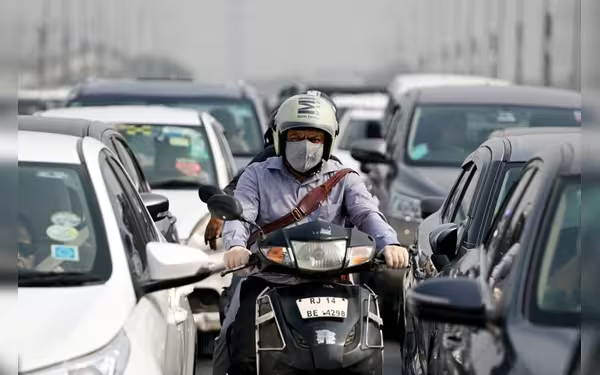Friday, November 8, 2024 01:05 AM
Hazardous Air Pollution Hits New Delhi as Diwali Approaches
- New Delhi's air quality reaches 'hazardous' levels.
- Farm stubble burning and fireworks worsen pollution.
- Government bans firecrackers to protect public health.
 Image Credits: arabnewspk
Image Credits: arabnewspkNew Delhi faces hazardous air pollution as Diwali approaches, prompting government action against firecrackers and stubble burning.
New Delhi, the bustling capital of India, is once again shrouded in a thick blanket of acrid smog as the season of hazardous air pollution begins. This annual phenomenon, primarily driven by fireworks and the burning of farm stubble, has reached alarming levels, with air quality monitors declaring it 'hazardous' for the first time this winter. The situation is dire, as health experts warn that the poisonous air contributes to thousands of deaths each year, yet many commuters continue to brave the streets without masks.
Each year, New Delhi faces the same grim reality. Farmers in neighboring regions burn stubble to clear their fields for the next planting season, a practice that significantly contributes to the city's air pollution. As the Hindu festival of lights, Diwali, approaches on November 1, the air quality is expected to deteriorate further. The celebrations often include the use of smoky fireworks, which release harmful pollutants into the atmosphere.
Recent reports indicate that levels of PM2.5 pollutants, which are tiny particles that can enter the bloodstream through the lungs and are known to cause cancer, have surged to more than 68 times the maximum recommended by the World Health Organization. Monitoring firm IQAir reported that pollution levels in New Delhi reached a staggering 344 micrograms per cubic meter, making it the world's most polluted city.
In response to this crisis, New Delhi's government has implemented a 'complete ban' on the manufacture and sale of firecrackers, citing the need to protect public health. However, previous restrictions have often been ignored, and police are frequently hesitant to enforce the law due to the strong cultural significance of fireworks among Hindu communities. Additionally, authorities have banned stubble burning, with several farmers in Haryana state recently arrested for violating this rule.
Despite these efforts, the problem of air quality in India remains unresolved. A study published in the Lancet medical journal revealed that air pollution was responsible for 1.67 million premature deaths in 2019 alone, highlighting the urgent need for effective solutions.
As the air quality crisis continues to unfold, it is crucial for citizens, policymakers, and communities to come together to address this pressing issue. Awareness and education about the health risks associated with air pollution, along with stricter enforcement of regulations, could pave the way for a cleaner and healthier environment. The time to act is now, as the health of millions hangs in the balance.













